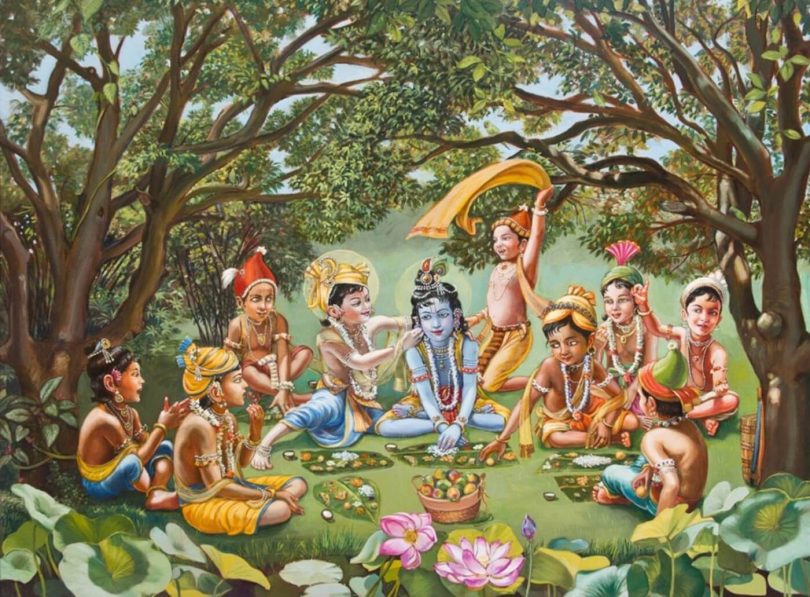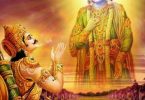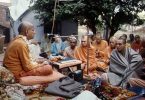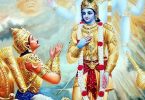Question: Do the Vrajavasis know of Krsna’s divinity?
Answer by Romapada Swami: On rare occasions, very briefly Krsna “draws back the curtain”, by bringing to their conscious awareness His being the Supreme Person. However, swiftly – immediately in fact – He again covers them with His yoga-maya potency. Thus, they completely forget all that they saw or understood, and resume their madhurya feature of prema and pranaya.
Read further below for specific references.
Examples:
TRANSLATION
Mother Yaśodā, by the grace of the Lord, could understand the real truth. But then again, the supreme master, by the influence of the internal potency, yogamāyā, inspired her to become absorbed in intense maternal affection for her son.
PURPORT
Although mother Yaśodā understood the whole philosophy of life, at the next moment she was overwhelmed by affection for her son by the influence of yogamāyā. Unless she took care of her son Kṛṣṇa, she thought, how could He be protected? She could not think otherwise, and thus she forgot all her philosophical speculations.
This forgetfulness is described by Śrīla Viśvanātha Cakravartī Ṭhākura as being inspired by the influence of yogamāyā (mohana-sādharmyān māyām). Materialistic persons are captivated by mahāmāyā, whereas devotees, by the arrangement of the spiritual energy, are captivated by yogamāyā.
Srila Visvanatha Cakravarti Thakur Commentary
Discerning the truth in this way, she desired to give up her sense of possessiveness. But then the Lord as a small boy thought, “Who will cuddle me? Who will hold me?” When he thought in this way, the very form of affection for her son overcame Yasoda.
Mayi in the phrase gives the meaning of affection itself, prema in the form of parental affection. Maya here indicates bewilderment. Yasoda became blinded by prema.
Jiva Goswami Tosani Commentary
Seeing her conviction, the Lord was pleased. But seeing her agitation, he became upset and then filled her with love. When she who protected her son by her motherly love had understood the truth mentioned in the first three lines of the previous verse for the purposes of Kṛṣṇa’s pastimes, the Lord who is capable of fulfilling her prayers spread his mercy (māyām) to her even more than previously, so that she would no longer see this vision which was contrary to her love.
This mercy was filled with deep affection for her son. That affection was deeper than any other person’s affection. This was not material affection but rather the svarūpa-śakti of Viṣṇu.
TRANSLATION
Immediately forgetting yogamāyā‘s illusion that Kṛṣṇa had shown the universal form within His mouth, mother Yaśodā took her son on her lap as before, feeling increased affection in her heart for her transcendental child.
PURPORT
Mother Yaśodā regarded the vision of the universal form within Kṛṣṇa’s mouth as an arrangement of yogamāyā, like a dream. As one forgets everything after a dream, mother Yaśodā immediately forgot the entire incident. As her natural feeling of affection increased, she decided to herself, “Now let this incident be forgotten. I do not mind. Here is my son. Let me kiss Him.”
Srila Visvanatha Cakravarti Thakur Commentary
Just as one quickly forgets a dream, Yasoda forgot completely about the universal form through the influence of maya. In the presence of aisvarya jnana, affection is restricted. Now, her affection was unrestricted, rather it increased even more. She is described as “one whose heart was spread (kalila) with increased affection.”
Jiva Goswami Tosani Commentary
Suddenly she forgot about questioning what had happened. She put the child who was born from her womb on her lap just as she had previously. As previously her heart had the strongest affection. This confirms that she forgot what had previous happened.
[End]
Krsna Rescues NM from the Abode of Varuna
TRANSLATION
The cowherd men were brought by Lord Kṛṣṇa to the Brahmahrada, made to submerge in the water, and then lifted up. From the same vantage point that Akrūra saw the spiritual world, the cowherd men saw the planet of the Absolute Truth.
PURPORT
The unlimited extension of spiritual light, called the brahmajyoti in Text 15, is compared to a lake called Brahma-hrada. Lord Kṛṣṇa submerged the cowherd men in that lake in the sense that He submerged them in the awareness of the impersonal Brahman. But then, as indicated by the word uddhṛtāḥ, He lifted them up to a higher understanding, that of the Personality of Godhead in His own planet. As clearly stated here: They saw, just as Akrūra did, the transcendental abode of the Absolute Truth.
The evolution of consciousness may be briefly summarized as follows: In ordinary consciousness we perceive and are attracted to the variety of material things. Rising to the first stage of spiritual consciousness, we transcend material variety and focus instead on the undifferentiated One, which lies behind and gives existence to the many.
Finally, rising to Kṛṣṇa consciousness, we find that the absolute, spiritual One contains its own eternal variety. In fact, since this world is a mere shadow of eternal existence, we would expect to find spiritual variety within the One, and indeed we do find it in the sacred text of Śrīmad-Bhāgavatam.
Astute readers may note that the pastime involving Akrūra takes place later in the Bhāgavatam, after the present affair with the cowherd men. The reason Śukadeva Gosvāmī says Akrūra saw Vaikuṇṭha purā, “previously, ” is that all these incidents took place many years before the conversation between Śukadeva Gosvāmī and Mahārāja Parīkṣit.
Srila Visvanatha Cakravarti Thakur Commentary – 10.28.16
Krsna gave them realization of Brahman, in which there is no particular awareness, as if immersing them in a lake (hradam). He then pulled them out of that realization by his remarkable powers and let them see vaikuntha (lokam). This is stated in the second canto of bhagavatam (2.7.31): he let them see the Gokula in Vaikuntha.
As the materialist is taken from the lake of matter to realization of Brahman, so the cowherd men were taken from the lake of Brahman realization to realization of Vaikuntha. Krsna delivered them from the dangerous, destructive sayujya to the blissful Vaikuntha. The realization of Vaikuntha with prema is superior to the realization of happiness in Brahman with no prema. But superior to the realization of happiness in Vaikuntha with prema is the realization of happiness in Gokula with prema.
To this Vaikuntha previously Akrura had gone; in this Vaikuntha previously Akrura saw his Lord. “Previously” indicates that it was previous to the conversation between Sukadeva and Pariksit, though in the narrative it occurs later.
Jiva Goswami Tosani Commentary
Giving details, what they saw is now described. He brought them to that place which is beyond prakṛti (brahman) and difficult to enter like a lake (hradam). He immersed them in it: by his power, he made them inquire about this condition, and they attained realization of that state. Then he pulled them out. Surpassing the initial general manifestation of spirituality, they then saw the place of para–brahman in human form, since they were qualified for the manifestation of his special form revealed through his svarūpa-śakti. They saw this directly with their eyes.
This was not something never experienced before: in this manifestation, Akrūra also saw or praised Vaikuṇṭha-loka.
The Lord, gratified by his worship, showed Brahmā Mahā–vaikuṇṭha, to which nothing is superior, which is free of suffering, confusion and fear of offenses and which is praised by the devatās who constantly see the self.
In Vaikuṇṭha there is no rajas or tamas, and no sattva mixed with rajas and tamas. There is no influence of time. There is no influence of māyā at all, what to speak of its products such as material elements. In Vaikuṇṭha the inhabitants are fully dedicated to the Lord and are worshipable by the devas, asuras and devotees.
Above Brahma-loka is the supreme abode of Viṣṇu. They know this as para–brahma, the eternal light. The place called Vaikuṇṭha is beyond the material world, endowed with six qualities, devoid of the three material guṇas and not obtainable by non-devotees.
This place is endowed with unlimited qualities, great effulgence, difficult to understand, invisible to material eyes, incomparable, supremely blissful, and beyond the senses. When the world becomes invisible by the Lord, that place which the renounced sages enter shines.
Kṛṣṇa brought them to Brahma-hrada, the holy place of Akrūra in order to glorify that place or because of sport. By his order they went in and came out and then saw Goloka. They saw Vṛndāvana as a special place. In that holy place, Akrūra previously saw Vaikuṇṭha. Special respect is given to this place since it is mentioned in the Bhāgavatam, the crest jewel of all scriptures. Because the sequence of events is being narrated (at a later date), the statement does not correspond with later events (the verse says Akrūra went there previously.)
TRANSLATION
Nanda Mahārāja and the other cowherd men felt the greatest happiness when they saw that transcendental abode. They were especially amazed to see Kṛṣṇa Himself there, surrounded by the personified Vedas, who were offering Him prayers.
PURPORT
Although the residents of Vṛndāvana considered themselves ordinary persons, Lord Kṛṣṇa wanted them to know of their extraordinary good fortune. Thus, within a lake in the Yamunā River the Lord showed them His personal abode.
The cowherd men were amazed to see that the kingdom of God had exactly the same spiritual atmosphere as their own earthly Vṛndāvana and that, just as in their Vṛndāvana Lord Kṛṣṇa was personally present, in their unique vision He was present as the Lord of the spiritual world.
As Śrīla Bhaktisiddhānta Sarasvatī Ṭhākura points out, these verses emphasize that Lord Kṛṣṇa did not merely show the cowherd men a sample Vaikuṇṭha planet but that He specifically revealed His Kṛṣṇaloka, the greatest of eternal abodes and the natural home of the residents of Vṛndāvana, who loved Kṛṣṇa more than anyone else did.
Srila Visvanatha Cakravarti Thakur Commentary
Seeing maha vaikuntha the cowherd men were filled with the highest bliss. This is because the experience of Vrndavana in Goloka of Vaikuntha was similar to the Vrndavana on earth. It is just like a millionaire who having lost all his wealth becomes full of bliss on finding some clue to the wealth. But then they began searching for Krsna, with the lotus face covered with drops of perspiration, worshipable by millions of their life airs.
Seeing him, they were astonished to see him being praised by the meters of verse personified. “Where have these effulgent beings praising Krsna come from? They are unknown to us, but we cannot ask them who they are. Though seeing us, he does not show his boyish manners and come towards us. He does not embrace us with his two arms. And we are restrained from approaching him and taking him on our laps. Today he has forgotten hunger and thirst. How can his mother live without feeding him?” In this way they were astonished.
Yogamaya sent by the lila sakti then brought them back to earthly Vrndavana. Rupa Goswami has explained this fact in a verse in Stavamala: “May you be protected by Mukunda who in order to teach the cowherd men that there is no place as sweet as earthly Vrndavana, showed them effortlessly Vaikuntha, and then brought them back to earthly Gokula.”
The dhāma of Kṛṣṇa called Gokula is the supreme abode. It is the center (pericarp) of a lotus with a thousand petals and it is sustained by a portion of the spiritual energy of Baladeva called Ananta.
One can reach Svarga by control of the senses and mind and execution of pious acts. One can reach Vaikuṇṭha by engaging in meditation on Viṣṇu. But it is very difficult to attain Goloka. And the planet protected personally by you (Gokula), O hero, and which destroys the suffering of the cows and other inhabitants, is the residence of the determined and disciplined devotees. Hari-vaṁśa
Kṛṣṇa who plays eternally with his associates in Goloka, which is a particular manifestation of Vṛndāvana manifesting within invisible forests on earth (aprakaṭa pastimes) – appears sometimes with his associates in the material world with visible form (prakaṭa pastimes).
These associates are eternally present with Kṛṣṇa. This is understood for scriptures which describe worship of Kṛṣṇa with his devotees.
When the associates appear in many forms, to nourish the rasa of the pastimes, Krsna produces a separate identity for each form – which does not search out the other forms since they do not make use of their eternal powers at that time.
Kṛṣṇa showed them Goloka, a special manifestation of Vṛndāvana, situated here (aprakaṭa Vṛndāvana). Since the forms of prakaṭa and aprakaṭa Vṛndāvana are actually non-different, he did not reveal intimate associates other than the cowherds who were observing that place (since those intimate associates would be their aprakaṭa duplicates). Thus, the personifications of the scriptures who were praising Kṛṣṇa were not intimate associates, similar to regular vandis who travel from place to place. Having the cowherds see the scriptures praise Kṛṣṇa was to establish his credibility.







